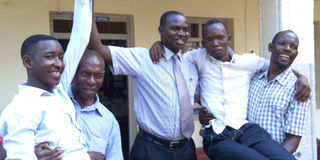Prime
A head teacher can make or break a school

Archbishop Kiwanuka Secondary School UACE stars celebrate victory with their head teacher Gerald Mulongosha (C) and parents. A school is said to be as strong as its head teacher. File photo
What you need to know:
What makes one head teacher better than the other? Is it their passion for the job or the contribution they make as the main administrators in a school? Esther Oluka finds out.
In 2015, Joachim Kateregga kicked off his new role as head teacher of St Andrew’s Monde Catholic Primary School, Luwero District. This was after getting transferred from Naluvule Primary School, also in Luwero District.
As Kateregga adjusted to his new role, he met several challenges. For starters, teachers had a fixated mindset, which was not easy to change.
“They were used to corporal punishments and it really took me time to let them know the consequences of their actions,” he says.
It took Kateregga a while to persuade them to stop using such punishment on pupils.
“I had to continuously lecture them on using alternative methods of discipline such as counselling rather than beating pupils. On some occasions, I would share stories about other teachers who had got into trouble because of beating pupils in an inhumane way. I hoped that by telling them these incidents, I would scare them,” he says.
Also, Kateregga would organise workshops where activists advocating for children’s welfare would go and talk to the teachers at the school.
The 46-year-old says the talks have eventually started paying off as the teachers at the school are now reformed.
Efforts recognised
Kateregga was among the 20 teachers recognised at an event held in Kampala recently when Raising Voices, a non-profit organisation that works to prevent violence against children and women, recognised exceptional head teachers.
Yvonee Laruni, the senior programmes officer at Raising Voices, says the ceremony was appreciating head teachers who are doing unique and outstanding roles in their respective schools. The post-teacher’s day activity was also organised in commemoration of the World Teachers Day celebrated annually on October 5.
“We reached out to head teachers to tell us how their current schools were like before they joined, the challenges they encountered, how they addressed them and the achievements they attained as a result of the initiatives they put in place,” she said.
Before the event, Raising Voices reached out to different headteachers, mostly from Lira, Kabarole, Luwero and Kampala. They were told to write essays highlighting their unique contributions to their current respective schools.
“Upon receiving the essays, a small committee sat down and went through the numerous submitted essays before zeroing down to 20 teachers who were awarded at the event,” says Laruni.
The teachers received certificates, a T-shirt and clocks embroiled with messages of gratitude.
Mentorship
At the same event, Filbert Baguma, the Uganda National Teachers Union (Unatu) general secretary, commended the head teachers’ efforts by thanking them for uplifting standards and improving the teaching and learning environments in schools. At the same time, Baguma stated that if head teachers wanted to be more exceptional at their work, it is also important they get more involved in mentorship roles.
“Coach these students and guide them more often so that in the near future when there are opportunities within the school, it is easy for them to step in and takeover a role,” Baguma said.
In order to boost school standards, Baguma emphasised the need to respect teachers’ rights more often as well as ensuring their work is celebrated and recognised.

Some of the teachers who were recognised at an event held in Kampala on October 18 by Raising Voice. PHOTO BY ESTHER OLUKA
Empowerment
Druscillah Biira, 42, who was also recognised, says before she became the head teacher of Mahyoro Primary School, in Kabarole District in 2011, pupils were dropping out because of lack of scholastic materials such as books, pencils, mathematical sets and school bags.
An inquiry into the reasons for the dropout cases revealed gaps in the economic ability of parents to purchase the items.
“I, therefore, found it necessary to economically empower the pupils to learn skills of weaving, knitting and wood work, where 50 per cent of their sales is used by the pupils to buy scholastic materials,” Biira reveals.
From wood, the pupils make items such as mingling sticks and seats, among other products. The products are sold within and outside the school premises.
According to Biira, 40 per cent of profits obtained from sales is used for purchasing materials for further use or re-invested in the knitting activity, such as buying threads, replacing worn-our needles and hooks.
Finally, 10 per cent is used in the appraisal of the best performers in a particular activity as a way of fostering healthy competition among participants.
A student’s point of view
Louis Byaruhanga, a former student of St Mary’s College Kisubi (Smack), says an exceptional head teacher is one who does not criticise weak students, but rather, encourages and motivates them to work harder.
“An effective head teacher does not mock or embarrass poor performers. Instead, they recognise their efforts and uplifts them,” Byaruhanga says.
He adds that effective headteachers also have personal academic relationships with their students and consider their best interests at heart.
Any determinants?
In the book, Being an effective head teacher, Trevor Male says there is no actual definition of an effective head teacher.
“Yes, we have aspirational models provided through images, metaphors and real-life practitioners and we have even published standards across the world that specify the tasks and personal qualities associated with formal school leadership, but none of these can be universally applied as each leadership is unique,” Male says in the book.
Further, Male notes that particular circumstances of a school are a major determinant of what an effective head teacher should be as the role is context bound. The process of becoming effective takes so much time because one needs to assimilate themselves with the demands of the job, the school as an organisation, the community the school serves and the system in which the school operates.



